|
BACK IN OCTOBER, a few days after Texas suffered its first and only loss of the 2022 NCAA volleyball season, Logan Eggleston sat down and braced herself. Coach Jerritt Elliott had asked the senior captain, the Longhorns' star player, the team's everything, to stop by his office. With bags under her eyes, she watched her coach of five years scan her weary face. "I am worried about you," he said. Tears pricked the corners of Eggleston's eyes. She took a deep breath. She didn't want to cry; tears meant weakness. The 6-foot-2 outside hitter on the No. 1 volleyball team in the country had less than six weeks left in her college career, and she wasn't playing her best. Worse yet, time was running out for her to achieve practically the only goal that had eluded her during her time at Texas: winning a national championship. She had held it together for so long. Over the past five seasons, she had always done what was asked of her. She had led her team to four consecutive Big 12 championships, two NCAA tournament regional finals and one national championship game. She had taken on the role of leader and activist when George Floyd was murdered and the university looked to her -- the president of the Student Athlete Advisory Committee -- for guidance. She was stressed. She was about to go play professional volleyball overseas, but she had no idea where. She was going to leave everything she knew behind. Then, there were all these bigger dreams -- the biggest dreams -- she hoped to pursue. Things kept adding up. "When we lost to Iowa State," Eggleston told ESPN. "I was like, this is a breaking point." Most people, including some of her closest friends, didn't know anything was off. As a biracial kid growing up in a predominantly white suburb of Nashville, Tennessee, Eggleston had long ago become adept at putting up a wall, adjusting the expressions on her face to avoid sticking out even more. She has always been the level-headed caretaker. She fixed problems, on and off the court. "Crying is not a sign of weakness, Logan," Elliott told her. "When you hold these things in, it festers into a volcano, but each time you do that, you're adding a little bit more to that volcanic stuff, and at some point it's going to come out." As she sat in front of Elliott in his office, she knew she couldn't put on a front any longer. She needed to feel her feelings. Five years earlier, she had texted Elliott at 3 a.m. after losing her first college game as a freshman starter, "This is never going to happen again." Elliott knew how much pressure Eggleston put on herself to be perfect. Now she heard him asking her to do the opposite: to embrace her imperfections. To cry. To show her team that she was not a stone-cold wall, that she was capable of being vulnerable. Elliott had coaxed her to talk about her emotions in the past, but there was a sense of urgency to his words now. "They want to see that you have emotions, you have feelings, you care," Elliott said to her. "And you're willing to share the tough times in your life with them." She listened and nodded. She said she understood. When she walked out of his office, a single tear trickled down her face. Throughout her career, Eggleston had used her power to excel on the volleyball court. Powerful kills. Powerful blocks. Powerful serves. Yet embracing her softer side might be the key to leading Texas to its first national championship in 10 years. It might also be the key to unlocking the door to the nation's highest office. "This moment is the biggest challenge she's faced in her life," Elliott said.
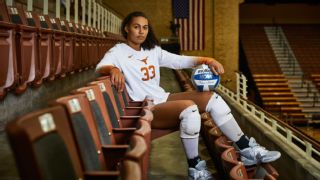 HAVE YOU HEARD the one about the volleyball player who wanted to paint the White House burnt orange? It's no joke. It only started that way. Back in 2021, when former Texas setter Jhenna Gabriel introduced her teammates before the COVID-delayed 2020 national championship game, she called Eggleston "your next president." Last month, when Texas middle blocker Asjia O'Neal congratulated Eggleston for winning a third straight Big 12 Player of the Year award, she captioned her photo: "Madame President." You know the adage about every good joke containing a grain of truth? "I've really thought about it for a long time," Eggleston says when asked about her presidential aspirations. She launches into a passionate monologue, her eyes wide, her hands gesturing wildly. "I lean way left," she says. She is pro-choice, she says. She needs to fight for the rights of women, she says. She needs to fight to protect the LGBTQ community, she says. She reels off a list of things she'd do differently, starting in Texas. "Building the wall I think is a waste of resources and money -- terrible," she says. "All of the camps at the border -- terrible." It's been two years since the reinvigoration of the Black Lives Matter movement, but Eggleston hasn't lost the urgency to fight -- the need to continue to demand equality and justice for the Black community hasn't abated. The 22-year-old already has led an entire community during a time of crisis. She has done it not just once, but every time it's been asked of her. And what better way to lead -- and change -- this world than running for the highest office in the nation? Before throwing her name in the hat for the presidency, though, Eggleston has other aspirations. First, she wants to represent Team USA at the Olympics and win the gold medal. Then, there are the entrepreneurial dreams. With an undergraduate degree in management (with a certificate in ethics and leadership in business) and a graduate degree in sports management (with a 3.59 GPA), Eggleston is regularly awake at 1 a.m. writing down business ideas. She could see herself as Texas' athletic director, which folks around her think is a low bar. First woman commissioner of the NFL? She could see herself excelling in that role. But if, Elliott says, Eggleston decides to run for president, "Look out." "I'll vote for her. I'll be on her campaign with her," O'Neal says. Like three former presidents, Eggleston traces her political springboard to Tennessee.
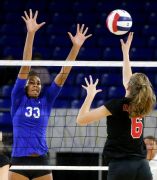 LOGAN EGGLESTON WAS 14 years old when she broke her father's heart. Stan Eggleston, a former college basketball player and a high school coach, used to take Logan to his gym in their hometown of Brentwood as often as he could. He hoped the sport he loved would stick with his lanky child with innate athletic skills. But Stan was not the kind of dad who would encourage his kids by letting them win. Logan, in fact, had zero W's to her name in their years-long one-on-one rivalry. But that fateful day when she was 14, she was victorious. As soon as her final shot went through the hoop, Logan handed him the ball. "Dad, I think I am done with basketball," she said. "I want to play volleyball." "I was heartbroken," Stan says now. But not necessarily surprised. Logan had always been fiercely independent. As a child, she would pepper her parents with questions about everything she saw. When her parents told her how something worked -- a puzzle or a word game -- she would mumble to herself, "Do it myself. Do it myself," over and over again. She hated when an instruction had to be repeated. She heard it once and replicated it the next time. Two years after she was born, her parents brought home her younger sister, Shaye, who followed Logan around everywhere. When Logan turned 13, she added volleyball to her list of activities. Throughout that year, she fumbled her way through volleyball practices and dominated her way through basketball games. She wasn't very good. And she didn't like the feeling of not being good. And that is exactly why she was drawn to it. "It was a challenge for me," Eggleston said. It was during one of those volleyball practices that Brentwood High School's coach -- the legendary Barbara Campbell -- noticed her. Logan wasn't perfect, by any means, but Campbell knew immediately that she had potential. She had impeccable hand-eye coordination, and for someone who was just learning the sport, she was calm and composed on the court. She called Jeff Wismer, a club coach in Tennessee, and said "Hey, Jeff, you got to check out this kid. We need to get her to play volleyball." "When I get the call from the legend, I'm going to go out and see this Eggleston kid," Wismer said. Wismer walked into practice and immediately was floored by her energy, her determination. She was 6-foot-2 and moved awkwardly, but he could see that she wanted to get better. He sat down with her parents and mapped out a plan. There's always one game that stands out in a coach's memory. For Wismer, that game -- the "Lo game" as he calls it -- was during a nationals club tournament in Tennessee during Eggleston's freshman year of high school. Eggleston's team needed to win to advance but was trailing in the decisive third set 11-3 (and the third set was played to 15). During a timeout, Wismer asked his players to look over at their opponents' huddle. Eggleston saw them laughing; they didn't think Eggleston's team had any chance of winning. Eggleston decided at that moment that she didn't want to lose. 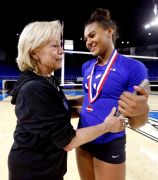 She began passing perfectly and blocking frequently. Then, she executed a shot she'd been working on for a year. It was an inside set, and she hit a cross-court kill away from her body. She looked over at the opposing coach, a look of pure determination. You don't believe that I can do this or my team can do this, but we're going to show you. When her teammate made a perfect block, she jumped up and down, overjoyed. Eggleston's team won 15-12. That day Wismer noticed something: Eggleston had a wonderful duality in her personality -- a combination of a fierce competitor who needs to win and a person who is obsessed with watching her teammates shine. "[It was] these quiet moments of Logan becoming Logan at a young age, that she was sincerely overjoyed that this kid was just playing way above her level in a high-pressure moment," Wismer said. At 16, Eggleston was picked for the U.S. junior national team and went on to win Team USA accolades including Most Valuable Player of the year and Best Server. During Logan's junior year of high school, Shaye joined the team. Logan practiced with her, and guided her through her first few months. At the end of the year, the Eggleston sisters helped Brentwood reach the state championship match. It was Brentwood vs. Ravenwood -- famously known in their community as the "Clash of the Woods" -- and the match was deadlocked at two sets each. Before the final set, Logan said to her team, "Set me every single ball. We're going to win this game." Brentwood won the set 15-1. Logan had 47 kills in the championship match. "Our entire team was uptight, everyone was scared that we were going to lose -- everyone except Logan," Shaye said. "Logan knew that she could handle it, she knew what it took." The team ran to Logan as soon as the game ended, celebrating its fifth straight state championship and Logan's third. "She became the most influential and dominant player from Tennessee," Campbell said. "There's no question in my mind." Logan didn't know it then, but that would be her last high school match. She finished her high school career an entire year early, deciding she had gotten everything she could out of high school volleyball. Top NCAA programs from across the country -- Stanford, Wisconsin, Minnesota -- wanted her. Stan dug deep and paid for the entire family to visit schools to ensure Logan picked the college that was right for her -- and her lofty dreams. When she toured the Texas campus in early 2017, she got the "feeling" that so many athletes talk about. Elliott convinced her to come play for him a whole year early. So, when she boarded the flight back home from Austin, she knew she'd be back. She just wasn't fully aware of all the baggage she was taking with her.
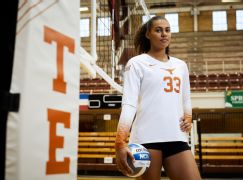 THE HAIRS ON Logan Eggleston's arms and neck stood up. She opened her mouth, but no words came out. She closed her mouth. Her reaction was the same every time, all the time. Every time kids around her in Tennessee used the N-word nonchalantly, mostly while quoting a song or a book, she would clench her teeth but say to herself, "They're not using it toward me." In volleyball, she would hear comments like, "She's Black, she's obviously more athletic." Born on Nov. 13, 2000, to a white mother, Lori, and a Black father, Stan, Logan entered the world with curly black hair and a smile that made crinkles form around her eyes. Brentwood, an affluent city of about 45,000 people, is nearly 87% white, according to the U.S. Census Bureau. Stan taught English and coached basketball, and Lori was a high school counselor. "[I was] trying my best to prepare her for the world and then thinking, 'Oh my God, I didn't prepare her for the world at all, because I know nothing about being a person of color,'" Lori said. Back then Logan would talk about the comments she heard with Shaye, but she didn't really know how to stand up for herself. She didn't have an example of an athlete doing that in her community. Stan played a bigger role in conversations around race, but there was only so much he could do when Logan and Shaye were out in the community living their lives and playing their sport. Logan also had to be Shaye's older sister. She had to protect her. That meant she had to be strong. It wasn't until Logan and Shaye left high school -- Shaye started her NCAA volleyball career at Alabama before transferring to Cincinnati -- that they realized how isolating their experience back home in Brentwood was. "When we both got out of high school, we had the experience of realizing, 'Oh, we're not actually ugly,'" Shaye said. "People just don't like people of color." It wasn't that people called them ugly -- or any other name -- to their faces. The Eggleston sisters just didn't get the same attention their white friends did. They didn't have boyfriends growing up. And they didn't have role models to follow. Those comments and glances already made Logan feel like an "other." So she vowed that in her most public setting -- the volleyball court -- she wouldn't add to that. No extra emotions. No showing anger. No showing fear. No showing tears. Never tears. There was already enough about her that people liked talking about. For a long time, Eggleston stayed quiet. That all changed at Texas.
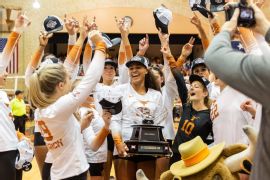 TWENTY-NINE MINUTES into a Nov. 18 class on Black mobility in the South as part of his Black Southerners In The Age Of Jim Crow course, professor Leonard Moore says, "Can I do something with your permission, real quick?" On the two screens in the William C. Powers Student Activity Center's auditorium at the University of Texas, Eggleston's name appears in large white font, with the Texas burnt orange as the background. "I have taught over 25,000 students. And I want to recognize one today. Can we do that?" Moore says. "Logan Eggleston, come on up front, please." Eggleston, seated in the far right side of the auditorium wearing her black winter jacket, her hair tied up in a ponytail, walks toward the podium, her eyebrows arched. What is going on? Her entire volleyball team, including Elliott, and her parents enter through the back door and join the 450 or so students in the packed auditorium. "On this campus, I don't think we celebrate Black women enough," Moore says. "So we're going to take the time to do that today." He proceeds to read a lengthy list of Eggleston's accomplishments: 2021 VolleyballMag.com National Player of the Year, 2021 Big-12 Volleyball Scholar Athlete of the Year, all-time Texas aces record holder, founder of the Developing Neighborhood Athletes Fund, founder of Longhorns for Equity, Access and Diversity Initiative. "I am getting tired reading it, all right?" he jokes. Elliott gives a speech about how Eggleston is leaving the program better than she found it. Her teammate and best friend, Asjia O'Neal, talks about how Eggleston empowers Black women across the country every day. Ryan Sutton, assistant dean for diversity, equity and inclusion at Dell Medical School, presents Eggleston with the 2022 Founder Award for the Black Student Athlete Summit. Trying to smile through her tears, Eggleston accepts the award. "I obviously can't do this without all the people who give me the support I need ... and to be the person I am," she says. "Thank you. I don't like crying, so that's all I am going to say." It was in Texas that Eggleston truly understood that she was a Black woman. That her skin color was her power. That her voice was her power. She saw women who looked like her -- on and off the court -- thrive in their skin, voice their opinions freely and unapologetically, and it made her want to shout her unspoken thoughts. As soon as she arrived on campus, she became fast friends with O'Neal, who taught her how to wear her hair and which silk bonnets -- used to protect naturally curly hair while sleeping -- to buy. In the process O'Neal taught Eggleston how to accept herself for who she was. Eggleston remembered asking her mom why she never taught her how to wear her hair. "I didn't know," she remembered her mom saying. It was also O'Neal who affirmed the power of Eggleston's voice. During the second round of the 2019 NCAA tournament against UC Santa Barbara, when Texas was huddled during a fifth-set timeout, words poured out of Eggleston before she could stop them. "We are not losing this game," she said firmly. Her heart hammered against her chest. Texas went on to win that final set 15-10. Afterward, O'Neal told her, "I've never heard you talk like that. We need more of that." "That's when I realized, 'Oh, my voice has power, and people listen and it actually does impact other people and make them want to change and elevate their play,'" Eggleston said. As she found power in her voice and in her opinions, in early 2020, she was made the president of the Student Athlete Advisory Committee. What she didn't know was this: Just a month or so after she was made president, she had to figure out a way to lead not just her fellow athletes, but the entire university. 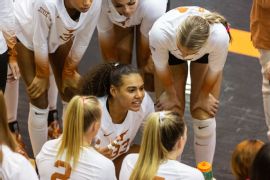 When the pandemic shut down the campus, Eggleston returned home to Brentwood. After the May 25, 2020, murder of George Floyd in Minneapolis, she spent days having long conversations with her parents around the injustices faced by the Black community. She talked to her father to hear his perspective, and treated tough conversations with her mom as practice for when she had to go out into the world and talk to non-Black people about her community. Then, the Texas football team reached out to her, asking her to post the team's list of demands on the SAAC Instagram account. She said yes. There was no doubt in her mind. Her community needed her and she would be there for them. The demands: renaming buildings named after segregationists or other former racist leaders of the country, replacing statues, and the most controversial one: replacing Texas' school song, "The Eyes of Texas," with a new song (the song has historical ties to minstrel shows performed in blackface). In addition to posting the demands on the SAAC social account, Eggleston also shared them on her own page, asking the Longhorns community to share the list far and wide. The post was shared by athletes across campus and soon was picked up by local and national media. She received Instagram DMs and messages from angry fans. But, more importantly, she received pushback from the university administration, she said. They reached out to her and asked her why the Student Athlete Advisory Committee decided to post on social media, instead of coming directly to them with it. "If I had asked them to do something behind closed doors, it would never have been done," Eggleston said. She wanted to keep the momentum going. Along with O'Neal, Eggleston wrote and produced the Longhorns' Black Lives Matter video campaign. "Time for change is now," she said in the video, her hands folded against her chest. The video went viral. The university put together a committee to study the history of the "The Eyes of Texas," and Eggleston was the only athlete picked to be a part of it. "What was impressive to me about her is [that] she's a woman of strong convictions, and in her mind, she's going to do what's right," Moore said. "The people [who] don't like it, that's on them. It's not on her." Soon, Eggleston began to see changes. The university announced the expansion of the University Diversity and Inclusion Action Plan and the expansion of the Texas Advance Commitment, which provides financial assistance to students from lower-income families. UT promised to erect two statues -- one of Heman M. Sweatt, the first Black student admitted into the UT law school who fought and won a Supreme Court case that allowed university desegregation across the country, and one of Julius Whittier, UT's first Black football letterman (the Whittier statue has since been unveiled). They university also changed the names of two landmarks, including the football stadium, which is now Campbell-Williams Field, named after Earl Campbell and Ricky Williams, the Longhorns' two Black Heisman Trophy running backs. In the meantime, Eggleston also began having conversations with her Tennessee community -- friends and former teammates -- about instances of racism in the past. She talked to them in person, over Instagram messages, you name it. "She was so level-headed, but is still so passionate about things," Lori said. "She just has so much stinkin' common sense." Eggleston helped organize the 2022 Black Student Athlete Summit in Houston and gave a speech. Around 700 people, including athletes, professors and administrators from across the country, listened to her talk about the importance of athlete activism. Her time at the University of Texas opened her up in ways she could have hardly predicted. It made her realize her dreams can be bigger. Even when the original dream still burns.
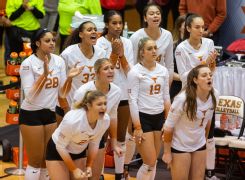 LOGAN EGGLESTON WALKS to the podium in the reception room of the Texas football stadium. She is wearing a black turtleneck, her hair damp and hanging in loose curls around her neck. It is Nov. 18 -- almost a month after her conversation with Elliott in his office -- and it's senior reception night, a day before her final regular-season home game. Her parents, step-aunt and her best friend growing up have flown to Austin for the weekend and sit among her teammates, coaches and their families. (Shaye, now a sophomore on Cincinnati's volleyball team, couldn't make it.) The room goes quiet, but there is applause as she begins her speech. "Jerritt," she says, looking at her coach. "[I was] 17 years old, came in, didn't really know who I was. I wanted to do something great. I appreciate you having the trust in me." She pauses, sucking in her breath as she feels a wave of emotion move through her body. Her father, Stan, rubs tears as they flow freely down his face. His firstborn had come a long way. In her freshman year in 2018, Eggleston helped lead Texas to the NCAA regional finals and was named Big 12 Freshman of the Year, posting 312 kills and hitting .278. In her sophomore year in 2019, Texas fell in five sets to Louisville in the regional semifinals, despite Eggleston's 17 kills, 12 digs and 4 aces. In the same year, she was made the team captain. In 2020, as her activism took off, she brought the same intensity on the court. Eggleston finished the 2020 season (concluded in April 2021 due to COVID-19 delays) with 468 kills (which ranked third in the NCAA) and 4.63 kills per set. She started in all 29 matches, was named Big 12 Player of the Year and led Texas to the national championship game. But the team fell to Kentucky in the final, and Eggleston's dream of winning the national championship stayed unfulfilled. The 2021 season came to an abrupt end with Texas suffering an upset loss to Nebraska in the regional finals. Eggleston, who repeated as Big 12 Player of the Year, put up big numbers -- finishing the season with 387 kills (20 of which came in the regional final), 269 digs and 64 blocks -- but it wasn't enough. She was named the VolleyballMag.com national player of the year. That day, Eggleston told herself one thing: She would do everything she could to bring home the championship in 2022.
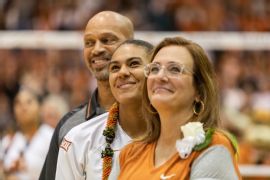 LOGAN EGGLESTON STANDS in Gregory Gym between Stan and Lori, the three huddled behind a large frame containing her burnt orange No. 33 jersey. Her teammate and fellow senior, Saige Ka'aha'aina-Torres, runs over to throw a garland around Logan's neck. The senior night celebration is underway, just minutes after Texas beat Baylor 3-1 in its final regular-season home game on Nov. 19. In a poetic ending, Eggleston got the final kill of the match, throwing her arms up in the air, smiling and hugging her teammates. Now, as she watches a video play on the big screen, a video in which Elliott and several other coaches talk about her "character" and what a "good human being" Eggleston is, her eyes well up with tears. She smiles, taking deep breaths as she slowly looks around the arena. Her parents; her boyfriend, Archer Saenz, and his parents; her best friend, Celia Lamb from Tennessee; another schoolmate and his mom; several young Black girls with posters and hats waiting to be autographed -- people she has known all her life and people she has inspired along the way -- look back at her. The month leading up to senior night had been challenging. A few days after Elliott called her into his office asking her to embrace her vulnerability, he called her back in again. He told her she was no longer going to play all six rotations. Her teammate Madisen Skinner had been playing really well, and he was going to give the spot to her. It was a calculated decision on Elliott's part. Knowing Eggleston, he thought it would challenge her. "I understand. I don't like it, but I'm a team player," Eggleston said to him. "I'm going to work to get my spot back." Exactly what Elliott had hoped to hear from her. And exactly what she did. Over the next four matches, her passing improved, Elliott says, and she continued to energize her teammates with her powerful kills, sharp serving and timely blocks. But after her front-row rotations and serve, she headed to the bench. During timeouts, she still owned the huddle, speaking clearly with purpose. "Logan would rather win with the role I've given her than be a six starter and lose," Elliott says. It was frustrating for Eggleston to be on the sidelines for long stretches. But it gave her a chance to realize that she can't fix everyone's problems all the time until she takes some time to process her own. She continued to meet with activists and organizers (she recently started a GoFundMe for Break The Pipeline, an Austin-based organization focused on keeping kids out of the criminal justice system by breaking the cycle of incarceration). "Sometimes it's like, 'Put me in there, I can fix things.' But I've also learned [that] I don't have to do everything because my teammates are capable, so that's been a really good lesson to see," Eggleston says. "They're very capable of putting a ball away and getting out of a tight situation, so it's been good for me to sit a little bit off to the side." But when the NCAA tournament started last week, Eggleston was back in her usual role, playing all six rotations for the top-seeded Longhorns. In Texas' first two wins, sweeps over Fairleigh Dickinson and Georgia, Eggleston showed off her versatility. In the two wins combined, she hit .421 with 18 kills, 7 digs, 6 aces and 5 blocks. The Longhorns next face Marquette on Thursday at home in the Sweet 16. They are four wins away from the title. She might have grand aspirations after her time in Texas -- the future president, the first woman NFL commissioner, an Olympic gold medalist -- but, for now, her eyes are focused on only one thing: the elusive national championship. She has given her everything to this sport since she handed her father the basketball eight years ago. In the final two weeks of her collegiate career, she is going to give everything she has to end her journey right: with the trophy in her teammates' hands. Time is running out. "I want to win. That's my goal in life all the time," Eggleston says. "I want to be the best."
|
